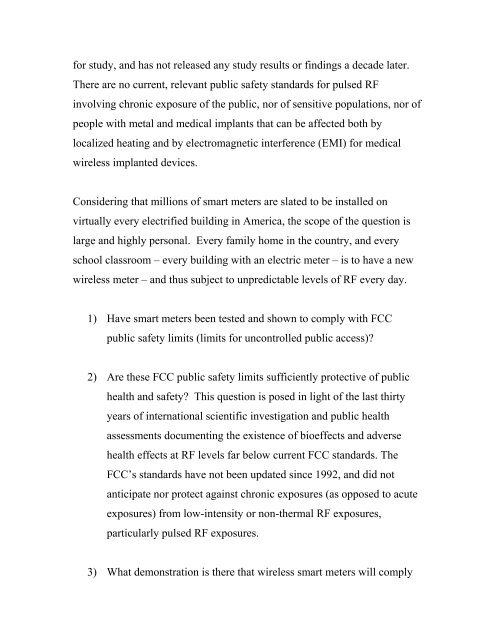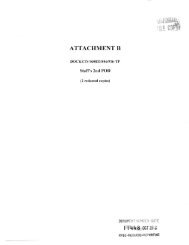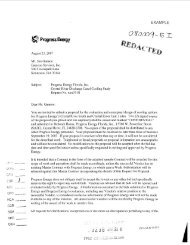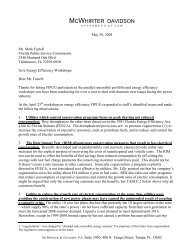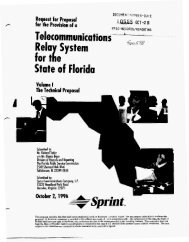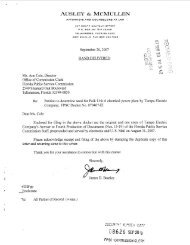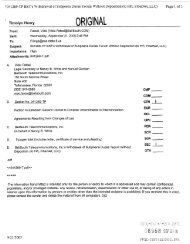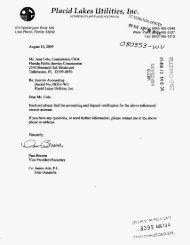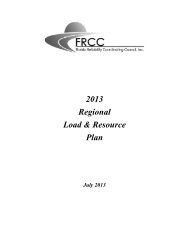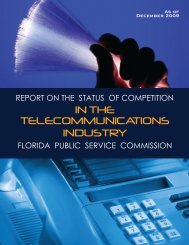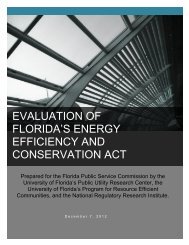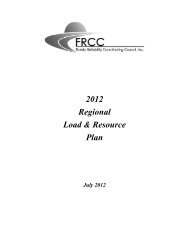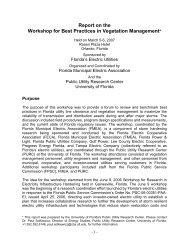- Page 1 and 2: Page 1 of 2 Walter Clemence From: S
- Page 3 and 4: Page 1 of 2 Walter Clemence From: S
- Page 5 and 6: Page 1 of 1 Walter Clemence From: S
- Page 7 and 8: more information about their energy
- Page 9 and 10: New PECO smart meters blamed for fi
- Page 11 and 12: Smart Meters Start Getting Hacked I
- Page 13 and 14: tie into the Smart Meter/Smart Grid
- Page 15 and 16: **”Smart Meters Fires and Explosi
- Page 17 and 18: valuable trends in how and when you
- Page 19 and 20: Survey results: wireless meters imp
- Page 21 and 22: 09/18/2012 05:06 AM Smart meter upd
- Page 23 and 24: itical 9/23/12 Problem with ‘Smar
- Page 25 and 26: itical 9/23/12 Problem with ‘Smar
- Page 27 and 28: itical 9/23/12 Problem with ‘Smar
- Page 29 and 30: itical 9/23/12 Problem with ‘Smar
- Page 31 and 32: itical 9/23/12 Problem with ‘Smar
- Page 33 and 34: itical 9/23/12 Problem with ‘Smar
- Page 35 and 36: January 1, 2011 SUMMARY OF FINDINGS
- Page 37 and 38: predicted in this Report, based on
- Page 39 and 40: (uW/cm2) depending on the duty cycl
- Page 41 and 42: particularly at risk (Tables 30-31)
- Page 43 and 44: Smart meters are a new type electri
- Page 45 and 46: might reduce it by running applianc
- Page 47: scenarios, analysis of whether and
- Page 51 and 52: Power transmitters installed on app
- Page 53 and 54: alternatively, absorption of RF ene
- Page 55 and 56: In this report, the public safety l
- Page 57 and 58: corresponds to continuous operation
- Page 59 and 60: minimal reflection factors of 100%
- Page 61 and 62: medical interference and health ris
- Page 63 and 64: (Table 3, ANSI/IEEE C95.1-1999, pag
- Page 65 and 66: EIRP = PG ERP = 1.64 EIRP where: EI
- Page 67 and 68: Reflection Factor This equation is
- Page 69 and 70: 3 inches from the outer surface of
- Page 71 and 72: and testes from instantaneous peak
- Page 73 and 74: Tables in this report show either d
- Page 75 and 76: operation, and possible FCC violati
- Page 77 and 78: Table 15 shows that for one collect
- Page 79 and 80: Table 20 shows that for one smart m
- Page 81 and 82: Where are RF levels associated with
- Page 83 and 84: (2007)? Tables 32 and 33 depict the
- Page 85 and 86: meter(s). For example, one smart me
- Page 87 and 88: space, depending on how the meter i
- Page 89 and 90: (47CFR Part 15): “The operator of
- Page 91 and 92: good ‘thermal sinks’ for locali
- Page 93 and 94: eflective environment on the absorp
- Page 95 and 96: TABLES OF CRITICAL DISTANCES IN NUR
- Page 97 and 98: TWA limit (One Collector, 1C+ 3 Sma
- Page 99 and 100:
in Smart Meters at 11” (One Colle
- Page 101 and 102:
conduction and blood flow through t
- Page 103 and 104:
Smart meters are a crucial componen
- Page 105 and 106:
Readers: SmartMeters interfere with
- Page 107:
"A mystery has been solved for us,"
- Page 110 and 111:
9/23/12 SmartMeterDangers.org-Home
- Page 112 and 113:
eters 9/23/12 spawn conspiracy talk
- Page 114 and 115:
EMF Safety Network Environmental pr
- Page 116 and 117:
As you may have noticed I have coin
- Page 118 and 119:
The pamphlet is entitled: “See Yo
- Page 120 and 121:
After our house in Half Moon Bay go
- Page 122 and 123:
will result in your power being shu
- Page 124 and 125:
hours a day, you wil constantly be
- Page 126 and 127:
I commend the EMF Safety Network an
- Page 128 and 129:
The scope of problems from transmit
- Page 130 and 131:
Well thank God FPL came and reinsta
- Page 132 and 133:
off grid solar systems - backwoods
- Page 134 and 135:
Electric bill skyrockets after smar
- Page 136 and 137:
Radiofrequency Radiation: The Invis
- Page 138 and 139:
identity information (electronic ea
- Page 140 and 141:
“if smart meters are banned and t
- Page 142 and 143:
Dr. David Carpenter, Professor, Env
- Page 144 and 145:
3. “Transmitting Smart Meters Pos
- Page 146 and 147:
Posted: Mar 19, 2012 4:05 PM EDTUpd
- Page 148 and 149:
Fire Concerns Lead PECO To Halt Sma
- Page 150 and 151:
Scott Cummings of northeast Philade
- Page 152 and 153:
Frustrated and outraged about her t
- Page 154 and 155:
energy as part of their routine ope
- Page 156 and 157:
Please continue donating to our Saf
- Page 158 and 159:
The new meters function within a "M
- Page 160 and 161:
information and habits of the occup
- Page 162 and 163:
evaluated. There are 46 counties an
- Page 164 and 165:
Dr. Martin Blank, PhD, of Columbia
- Page 166 and 167:
government agencies cared about saf
- Page 168 and 169:
Good News in Oregon & Florida JULY
- Page 170 and 171:
installation in Florida has been go
- Page 172 and 173:
However, anti smart meter websites
- Page 174 and 175:
employee working on the electrical
- Page 176 and 177:
“Other physical problems relate t
- Page 178 and 179:
Are Smart Meters Hazardous To Your
- Page 180 and 181:
Image via Shutterstock With hundred
- Page 182 and 183:
See Final Narrative Here:Wireless U
- Page 184 and 185:
(Crain's) — A River Forest reside
- Page 186 and 187:
Here’s why people, communities an
- Page 188 and 189:
It’s precisely why the Smart Mete
- Page 190 and 191:
your home. Read the article, “The
- Page 192 and 193:
(http://smartmetersafetydotcom.file
- Page 194 and 195:
We are now planning to move to Sout
- Page 196 and 197:
society, into a desperate and miser
- Page 198 and 199:
no jurisdiction over my utility com
- Page 200 and 201:
___________________________________
- Page 202 and 203:
disease? __________________________
- Page 204 and 205:
diet changes and medication to help
- Page 206 and 207:
We request that the meter be replac
- Page 208 and 209:
___________________________________
- Page 210 and 211:
our apartment in spite of debilitat
- Page 212 and 213:
___________________________________
- Page 214 and 215:
Where am I going to be safe? NO wi-
- Page 216 and 217:
Michelle, Sacramento ______________
- Page 218 and 219:
And I just got the blank stare, the
- Page 220 and 221:
Dear Barbara Boxer: I’m currently
- Page 222 and 223:
symptoms. Also while in our apartme
- Page 224 and 225:
The smart meter was installed in my
- Page 226 and 227:
drains you, and the other is the he
- Page 228 and 229:
of the room, but I’m scared to de
- Page 230 and 231:
children. And I know there is no wh
- Page 232 and 233:
SmartMeters, because I had heard th
- Page 234 and 235:
edroom. I have been having sleep pr
- Page 236 and 237:
___________________________________
- Page 238 and 239:
a prior immune disability and I tho
- Page 240 and 241:
egularly becomes staticy to the poi
- Page 242 and 243:
He then said he was going to check
- Page 244 and 245:
home with radio frequencies. After
- Page 246 and 247:
in humans. [My paper] J R Jauchem
- Page 248 and 249:
animals and human beings. Melatonin
- Page 250 and 251:
sev nausia, heart palitations and c
- Page 252 and 253:
http://sagereports.com/smart-meter-
- Page 254 and 255:
discussed !!!! SoCal Edison and the
- Page 256 and 257:
I started to research the health ef
- Page 258 and 259:
are getting sick since we moved her
- Page 260 and 261:
9/23/12 Smart Meter Fires and Explo
- Page 262 and 263:
9/23/12 Smart Meter Fires and Explo
- Page 264 and 265:
9/23/12 Smart Meter Fires and Explo
- Page 266 and 267:
9/23/12 Smart Meter Fires and Explo
- Page 268 and 269:
9/23/12 Smart Meter Fires and Explo
- Page 270 and 271:
9/23/12 Smart Meter Fires and Explo
- Page 272 and 273:
9/23/12 Smart Meter Fires and Explo
- Page 274 and 275:
9/23/12 Smart Meter Fires and Explo
- Page 276 and 277:
9/23/12 Smart Meter Fires and Explo
- Page 278 and 279:
9/23/12 Smart Meter Fires and Explo
- Page 280 and 281:
9/23/12 Smart Meter Fires and Explo
- Page 282 and 283:
9/23/12 Smart Meter Fires and Explo
- Page 284 and 285:
9/23/12 Smart Meter Fires and Explo
- Page 286 and 287:
9/23/12 Smart Meter Fires and Explo
- Page 288 and 289:
9/23/12 Smart Meter Fires and Explo
- Page 290:
Smart meters are an essential part
- Page 314 and 315:
they live near a relay meter or if
- Page 316 and 317:
are being deployed rapidly and stea
- Page 318 and 319:
It seems that 5%-10% of the populat
- Page 320 and 321:
9/23/12 Pricing Problems - Stop OC
- Page 322 and 323:
9/23/12 Pricing Problems - Stop OC
- Page 324 and 325:
9/23/12 Pricing Problems - Stop OC
- Page 326 and 327:
Commission President Michael Peevey
- Page 328 and 329:
Page 1 of 5 Walter Clemence From: S
- Page 330 and 331:
Page 3 of 5 Our charge - Ezekiel 33
- Page 332 and 333:
Page 5 of 5 -- Website: www.SpruceC
- Page 334 and 335:
Page 2 of 3 brains also happens in
- Page 336 and 337:
Page 1 of 1 Walter Clemence From: S
- Page 338 and 339:
Page 2 of 2 of this Aug. 28 meeting
- Page 340 and 341:
Page 2 of 3 throughout the US and C
- Page 342 and 343:
Page 1 of 3 Walter Clemence From: S
- Page 344:
Page 3 of 3 -- Website: www.SpruceC


